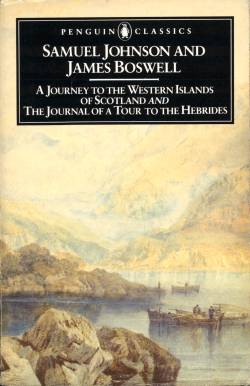
|
Still reading this. It is every bit as good as one could expect. More soon. |
It is the fashion among the pretentious literati to list the books which they have recently read and/or are currently reading. I am neither pretentious nor literate (hah, hah), but here is my list of recent reads (select the links for insipid drivel which I pass off as “commentary”, and for lovely cover scans):

|
Still reading this. It is every bit as good as one could expect. More soon. |
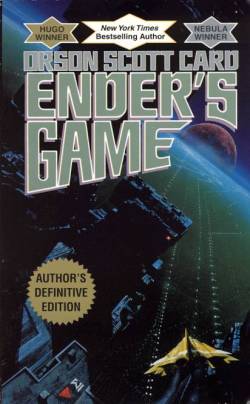
|
Stegall and Loest both swore to me that this was the best science-fiction book. Ever. After all, the incomparable feline Wiggin was even named for its protagonist, Ender Wiggin. So, does the book match the hyperbole ? Well, I'm not a heavy science-fiction reader, so I cannot judge overall greatness. But this book was readable (I did it in a few sittings) and had a good storyline. I didn't even see the surprising climax coming. Ack. The denouement was a bit deflating, but that's how they usually are. Oh, the plot is something along the lines of humanity is preparing to fight the second wave of an interstellar war against these arthropodal xenomorphs (bugs). But what is needed is Earth's most brilliant military strategist; Ender Wiggin enters school with many others to see who is The One, humanity's greatest hope. Ender is. A lot of neat concepts is this book. It comes with a sequel, as well. |
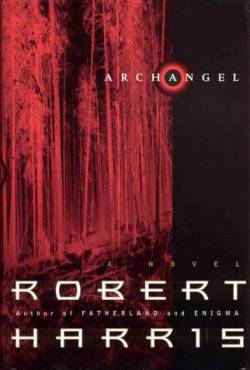
|
Having read and thoroughly enjoyed Harris's Enigma, when I saw
Archangel placed on the bargain table, there was no hesitation in
picking it up as I walked to the checkout.
What is archangel ? Actually, it is Archangel, a city much north of Moscow; pivotal destination in a modern-day historian's quest to solve a mystery from the dying days of the Stalinist era; dreary hometown of a character key to linking Stalin's final years to present-day Russia. Harris's style in the first chapter grated on my nerves, but the storyline was compelling - so much so that I stayed up two consecutive nights to read this book in two sittings ! (The writing style changed in ensuing chapters, so the reading was easy.) Were I to choose between Enigma and Archangel, the former would be the clear choice - the ending in the latter was way too deflating. I do not regret having read Archangel and certainly would recommend it, with the qualification about its ending. |
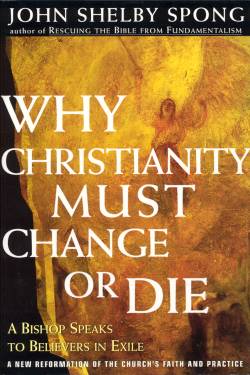
|
Nutshell: Spong suggests that Christianity must eschew its mystical and spiritual underpinnings, or it will fade into oblivion. Hmmm. The result, essentially, is that Spong's Christianity sounds more like all the usual New Age hoo-hah, only he would be too politically correct to say so. Spong's earlier works, although perhaps less polished, are much more forceful and lucid. This book has a logical successor, its sequel, which I am in no hurry to tackle. Standard disclaimer: Not for Fundamentalists. But then, few of them can read, anyway. |
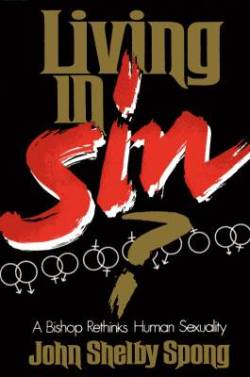
|
Nutshell: Spong explores the fallacies of applying contorted and contradictory ancient Hebrew sexual mores to our society. (I would rant on for a while, but Spong does so more authoritatively.) Spong brings up a lot of great points, very few with which I could take issue. This is a great example of mid-mission Spong, before he went off the politically correct deep end in his most recent works. Not for Fundamentalists. But then, few of them can read, anyway. |
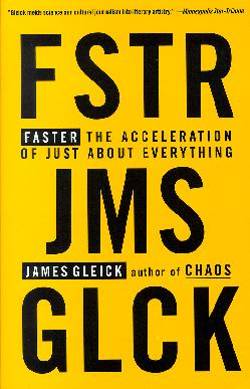
|
Gleick touches upon a facet of post-post-modern (?!) life that its
participants know very well about but don't take the time to ponder: the
paces of our lives are accelerating. How is it that we hurry
from one event or obligation to the next, to make it home late to pass
another shortened night to prepare for yet another sleep-deprived day
? Gleick attempts to trace the history of the acceleration of
society's lifestyles. The result is a book which although not
profound in its conclusions is far-reaching in its insights. Gleick's
pace is frenetic (one reader admitted to being "stressed" while
reading this book, requiring breaks).
Aaaaargh ! That's why I drink decaf. Oh, which reminds me, Gleick also introduced me to retronyms. Regular coffee or decaf ? |
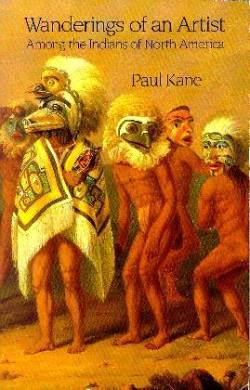
|
In the back half of the 1840s, Irish-born Canadian Paul Kane set off across Canada and northern USA to sketch American Indians. This book represents his account of four years of travels. Although Kane insists he is not an author, only an artist, the journal is quite fascinating. I highly recommend this book (best of all, it's a Dover !). Kane's account is interesting for the modern reader, if for nothing else than the uncertain and precarious nature of his travel arrangements. He truly would have tales of hardship for his grandchildren - whitewater crossings in equipment which many present-day sports(wo)men would eshew, long treks through deep snow in mercury-freezing chill, treacherous wades through icy torrents, foodless and waterless wanderings through deserts, risky encounters with unknown Indian parties. But beyond all the hardships, Kane weaves an enthralling yarn detailing the mores and practices of the peoples whom he met. With prescience, he laments the demise of these cultures, as he realizes that as more Europeans come, the indigenous peoples will brutally be displaced. |
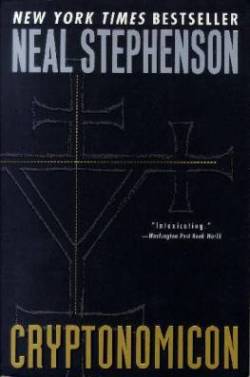
|
This is clearly one of the best books that I have read in years (granted, I've only read a few). What else would compel me to read a 900+ page book ? Almost from the beginning, Stephenson grabs your attention with almost bizarre expositions of the book's many storylines, interwoven with a craft that would flummox even James Burke. The reader follows the fortunes and (mis)adventures of several families and individuals over three generations and as many continents, piecing together a puzzle of secrets which culminates in ... an almost anticlimactic ending. The final ten-to-twenty pages notwithstanding, this book lives up to its review description of "intoxicating". I think I'll re-read it someday soon. Gxnn bhldh sqrd m! |
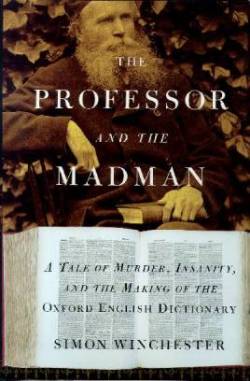
|
This is a very interesting book, particularly since one of my favorite
indulgences is perusing the OED. Before I read this book, I had not even
considered how the OED had been fashioned. Winchester's focus on the
relationship between Murray and Minor is an interesting take, but overall I
felt the book to be overwritten (excessively flowery in style) and too verbose
(Winchester didn't seem to have much to say, but he had to drag the story out
to fill pages and add book thickness). Too harsh a judgement ? No. But the
book is worth reading, nonetheless. If you read this book, then you will learn, if you don't already know, what zyxt means. |